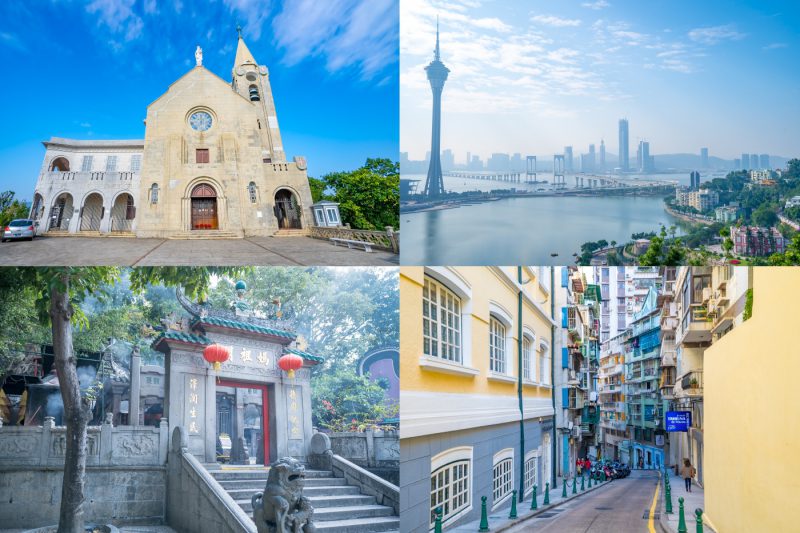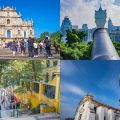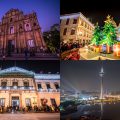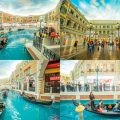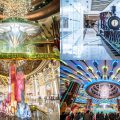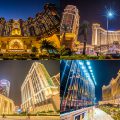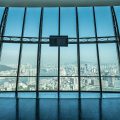[Introduction]
I traveled to Macau in mid December. I went around the World Heritage sites in Macau Peninsula in the first half and mega resorts in Cotai area in the latter half. In this article, I will write about World Heritage “Historic Centre of Macao” and Penha Church etc. as part of Day 2.
[Visit Places (series of articles)]
* Day 1: Go to Macau via Hong Kong-Zhuhai-Macao Bridge
* Day 1: Around Lisboa (Light-up)
* Day 2: Penha Church etc. [This article]
* Day 2: Senado Square etc.
* Day 2: Ruins of St. Paul’s, Mount Fortress, St. Lazarus District etc.
* Day 2: Ruins of St. Paul’s, Senado Square etc. (Light-up)
* Day 3: Sands Cotai Central
* Day 3: The Venetian Macao
* Day 3: The Parisian Macao (Light-up)
* Day 3: Studio City Macau (Light-up)
* Day 4: City of Dreams
* Day 4: MGM Cotai, Wynn Palace
* Day 4: Galaxy Macau
* Day 4: The Venetian Macao etc. (Light-up)
* Day 5: Macau Tower
* Day 5: Return Home
[Travel Date]
2018.12.14-18
[Main Part]
Breakfast at “Noite e Dia Café (不夜天Café)” in Lisboa
The second day of my Macau trip started. First, I will have breakfast.
Since meals were not included in my accommodation plan, I needed to find a place to have breakfast. Unfortunately, however, it seemed there were not suitable restaurants that were open from early in the morning around here, so I decided to visit “Noite e Dia Café (不夜天Café)” in Hotel Lisboa where I was staying in the end.
The restaurant served buffet breakfast.
Here are main dishes I chose.
Second attempt.
World Heritage “Historic Centre of Macao”
On the second day of my Macau trip, I will spend all day to walk around World Heritage “Historic Centre of Macao”.
“Historic Centre of Macao” is a collection of over twenty locations and was inscribed on the UNESCO World Heritage List in 2005. It shows the unique assimilation and co-existence of Chinese and Portuguese cultures in Macau.
As you can see below, sites of “Historic Centre of Macao” are concentrated in southwest area of Macau Peninsula. Among them, I will stroll around the lower left side in the morning.
St. Lawrence’s Church
So, I will begin to walk around World Heritage “Historic Centre of Macao”.
I started my walk from “St. Lawrence’s Church (聖老楞佐教堂/Igreja de S. Lourenço)”.
St. Lawrence’s Church was built by the Jesuits in the mid-16th century, and this is one of the three oldest churches in Macau. At that time, sea was seen from the church and families of Portuguese sailors gathered to the church to pray for safe voyage.
The interior of the church.
I will move southwest to the next destination from St. Lawrence’s Church. I was able to get a brief glimpse of ordinary life in Macau through the street on the way.
Mandarin’s House and Lilau Square
I reached “Mandarin’s House (鄭家大屋/Casa do Mandarim)”.
Mandarin’s House was built as the traditional Chinese residential compound home of prominent Chinese literary figure Zheng Guanying. It occupies a land area of approximately 4,000 square meters and about 300 people lived there at its peak. Mandarin’s House was open to the public during the daytime, but its opening hours didn’t suite my schedule, so I just took photos of its exterior.
There was “Lilau Square (亞婆井前地/Largodo Lila)” across Mandarin’s House.
Lilau means spring water from mountains in Portuguese. It is said this was one of the areas where Portuguese began to live in Macau.
On the way to the next destination.
A-Ma Temple and Barra Square
I reached “A-Ma Temple (媽閣廟/Templo de A-Má)”, which was located at the farthest southwest areas in “Historic Centre of Macao”.
A-Ma Temple was built in 1488 and one of the three oldest temples in Macau.
In the temple.
In front of A-Ma Temple, there was “Barra Square (媽閣廟前地/Rua da Barra)” and it also consisted of World Heritage “Historic Centre of Macao”.
By the way, it had been cloudy since I came to Macau yesterday, but the sky finally started to clear up.
I will go back to St. Lawrence’s Church, the starting point of walking around world heritage sites.
Moorish Barracks and Penha Church
On the way, there was “Moorish Barracks (港務局大樓/Capitania dos Portos)”. It was also one of the world heritage sites, but unfortunately it was under construction for remodeling.
I just went into a side street.
Then, I came to “Penha Church (主教山小堂/Ermida de Nossa Senhora da Penh)”.
Penha Church was built in 1622 by Augustine’s monks. Unlike other spots I visited so far, Penha Church was not included in the list of World Heritage “Historic Centre of Macao”. However, when I read guidebooks etc., I found Penha Church was very photogenic, so I decided to visit it along with world heritage sites.
As Penha Church was located on a hill, visitors were able to enjoy panoramic views of Macau city. For example, you can see Macau Tower on the left.
For another example, you can also see Grand Lisboa and Wynn Macau, which I visited last night.
St. Lawrence’s Church and St. Joseph’s Seminary and Church
I returned to St. Lawrence’s Church. Now it was sunny, I took a picture of St. Lawrence’s Church again.
Then, I will move toward northeast from St. Lawrence’s Church.
This was “St. Joseph’s Seminary and Church (聖若瑟修院及聖堂/Igreja e Seminário de S. José)”.
St.Joseph’s Seminary and Church was built from 1746 to 1758 by the Society of Jesus.
In the church. I heard remains of upper part of the Francis Xavier’s arms were enshrined.
In addition, there was a church that were not included in the world heritage list and didn’t appear in guidebook. I found this unknown church was impressive.
Dom Pedro V Theatre, St. Augustine’s Church and Square and Sir Robert Ho Tung Library
I moved to northeast further and came to a street where several world heritage sites were concentrated.
To begin with, “Dom Pedro V Theatre (崗頂劇院/Teatro D. Pedro V)”.
Dom Pedro V Theatre was opened in 1860 as the first western-style theatre in China. This has survived as a highly significant cultural landmark in the context of the local Macanese community and remains a venue for important public events and celebrations.
Across Dom Pedro V Theatre, was there “St. Augustine’s Church (聖奧斯定教堂/Igreja de Santo Agostinho)”.
St. Augustine’s Church was established by Spanish Augustinians in 1591. Unfortunately, I was not able to go into the church due to construction.
Last but not least, there was “Sir Robert Ho Tung Library (何東圖書館大樓/Biblioteca Sir Robert Ho Tung)” innermost.
Sir Robert Ho Tung Library is the largest library in Macau. It was originally the residence of Dona Carolina Cunha. Hong Kong businessman Sir Robert Ho Tung purchased it in 1918, using it as his retreat. He passed away in 1955 and in accordance with his will, the building was presented to the Macao Government for conversion into a public library.
In the building.
The area around the street was called “St. Augustine Square (崗頂前地/Largo de Santo Agostinho)”, which also consisted part of world heritage sites.
Then, I move to northeast further.
As it is a good timing, I will stop this article here.
[Closing]
That’s it for the article about World Heritage “The Historic Centre of Macao” and Penha Church etc. as part of Day 2.
As for World Heritage “The Historic Centre of Macao”, Senado Square and Ruins of St. Paul’s are the most famous among them, so world heritage sites I visited in this article may be less known. However, I was impressed with not only each world heritage site, but also its street where I was able to see a glimpse of Macau life.
In addition, Penha Church, which is not included in world heritage sites, was also as impressive as world heritage sites. I believe it was worth a visit 🙂
In the next article, I will write about Senado Square etc. as part of Day 2.
[Map]
1 Hotel Lisboa
2 St. Lawrence’s Church
3 Mandarin’s House
4 Lilau Square
5 A-Ma Temple
6 Barra Square
7 Moorish Barracks
8 Penha Church
9 St.Joseph’s Seminary and Church
10 Dom Pedro V Theatre
11 St. Augustine’s Church
12 Sir Robert Ho Tung Library
13 St. Augustine Square
[Related Link]
Macao Government Tourism Office
Hotel Lisboa
Historic Centre of Macao (Macao Government Tourism Office)
Historic Centre of Macao (UNESCO)
I would appreciate it if you could share my article via the following SNS buttons.

